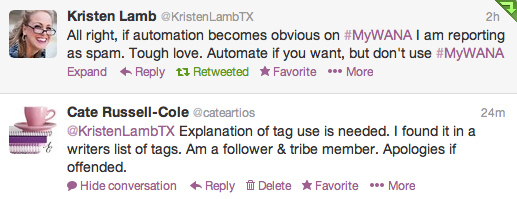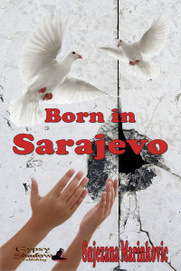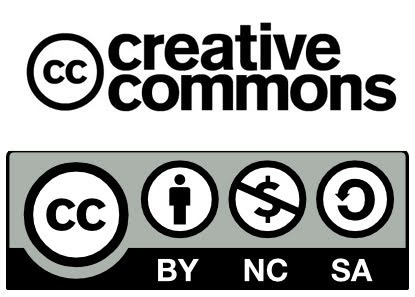Cate Russell-Cole's Blog, page 35
June 16, 2013
Science Fiction Writing with Ray Bradbury
 “You must stay drunk on writing so reality cannot destroy you.”
“You must stay drunk on writing so reality cannot destroy you.”
“If you want to write, if you want to create, you must be the most sublime fool that God ever turned out and sent rambling. You must write every single day of your life. You must read dreadful dumb books and glorious books, and let them wrestle in beautiful fights inside your head, vulgar one moment, brilliant the next. You must lurk in libraries and climb the stacks like ladders to sniff books like perfumes and wear books like hats upon your crazy heads. I wish you a wrestling match with your Creative Muse that will last a lifetime. I wish craziness and foolishness and madness upon you. May you live with hysteria, and out of it make fine stories: science fiction or otherwise. Which finally means, may you be in love every day for the next 20,000 days. And out of that love, remake a world.”
“I have never listened to anyone who criticized my taste in space travel, sideshows or gorillas. When this occurs, I pack up my dinosaurs and leave the room.”
Filed under: Writing Resources Tagged: Writing Rocket Fuel








June 14, 2013
Your Misfortunes Lead You Somewhere… Author, Alice Walker

“So in the end you can’t even really regret your misfortunes,” explains the beloved author Alice Walker, “because they led you somewhere.”
 Alice Walker is a Pulitzer Prize-winning novelist and poet. As the author of The Color Purple…“Walker speaks from experience. From growing up poor in the segregated south and losing part of her vision in a childhood accident to receiving threats from the Ku Klux Klan for her interracial marriage and work with the NAACP in 1960s Mississippi, Walker has experienced her share of hardships. But over the years she has channeled these experiences into groundbreaking fiction about the lives of blacks in America, becoming one of the most celebrated writers of her time. Through her continued dedication to writing and politics she remains a powerful example of what it means to lead a purposeful life.”
Alice Walker is a Pulitzer Prize-winning novelist and poet. As the author of The Color Purple…“Walker speaks from experience. From growing up poor in the segregated south and losing part of her vision in a childhood accident to receiving threats from the Ku Klux Klan for her interracial marriage and work with the NAACP in 1960s Mississippi, Walker has experienced her share of hardships. But over the years she has channeled these experiences into groundbreaking fiction about the lives of blacks in America, becoming one of the most celebrated writers of her time. Through her continued dedication to writing and politics she remains a powerful example of what it means to lead a purposeful life.”
Please visit her web site at: http://alicewalkersgarden.com
Filed under: "Dose of Inspiration" Video Tagged: Alice Walker, author, behaviour, biography, challenge, conflict, family history, fiction, growth, ideas, inspiration, life story, motivation, passion, resource, success, the Color Purple, writer, writing








June 12, 2013
Writing Topic and Description Inspiration: Getting Ideas Flowing
 When I started feature article writing, the biggest hassle I had was being able to get out of my habitual, biased way of thinking. I was tending to stay stuck in what I knew: the same topics, the same sources and the same approaches to issues. It was too limiting. With a monthly column, I needed new material; and I also needed frequent writing practice. Morning pages or writing daily is a brilliant idea, but you have to start with something, anything to write about! I can’t start with an empty page. It stays empty.
When I started feature article writing, the biggest hassle I had was being able to get out of my habitual, biased way of thinking. I was tending to stay stuck in what I knew: the same topics, the same sources and the same approaches to issues. It was too limiting. With a monthly column, I needed new material; and I also needed frequent writing practice. Morning pages or writing daily is a brilliant idea, but you have to start with something, anything to write about! I can’t start with an empty page. It stays empty.
As these were the days before Google, I spent time in the local University library, used writing prompts and relied on quote dictionaries and books such as “The Friendship Book of Francis Gay” for daily ideas. The more topics I discovered through searching, the more ideas I got; thus the easier it was to write.
One of my favourite sources of ideas is an early 1900s dictionary. It contains many words which are out of common use and that bring plot ideas, character traits and other genres to mind. As I get so much from this book, I decided that every month I would post a short list of words from it. They are great words! Some are usable if you write Steampunk or historical works; with others, you can take the definitions as a prompt and have fun with them. It’s your choice how to use the list of words. If you wanted to join them all into one piece of writing, just think what you can do with a storehouse, arsenic and an army reference…
Please note that like this blog, all spelling is Australian. This book was published in Sydney by a British owned company. I am starting with my all-time favourite word: contretemps.
Contretemps: an unexpected and embarrassing event.
Bleb: a bubble, in water; a blister.
Entrepot: a storehouse, or centre for the collection of goods.
Orpiment: a yellow mineral of the arsenic group, used as colouring.
Stratography: description of an army, or what belongs to an army.

From the Powerhouse Museum, Sydney
The words come from “Hoderns Home Dictionary: A Book of General Reference ETC. ETC… It is designed to meet a twofold want…” Thus you can tell how old the book is…
If any of these definitions don’t sound right to you, remember fashions and understandings dramatically change. For example, erotic is: “to love, amatory” in the old dictionary. In 2013 Google defines it as: “relating to, or tending to arouse sexual desire or excitement.” Where has all the subtlety gone?
This blog post by Cate Russell-Cole is licensed under a Creative Commons Attribution-NonCommercial-ShareAlike 3.0 Unported License. You are free to share and adapt it.
Filed under: What's On, Writing Resources Tagged: author, creativity, dictionary, fiction, idea, inspiration, morning pages, old world, practice, prompt, resource, skill development, The Friendship book, uncommon, Words, writer, writing, writing practice








June 11, 2013
Twitter Tag Use and Tweet Scheduling for Writers: Accidental Misuse is Too Easy
When I was first learning to use Twitter, I found a master list of 140 hashtags for writers: it was a goldmine! In it were tags such as #mywana, #nanowrimo, #row80 and #writemotivation. In my ignorance I thought that those were simply tags you freely placed on posts, so they would grab the attention of readers in those areas. I messed up. These are community tags which should not have been used that way. I should have researched each of these tags properly before use. I had placed myself at risk of being reported for spam and being liberally blocked.
I received this wake-up call when I found this post on Twitter this week.

If a tag belongs to a community, you do not use it for promotion. If you do, you are spamming. That is against Twitter rules. It is also deeply offensive to that writing Community.
I have just spent a crazy amount of time going through my scheduled posts removing all offending tags. On thinking and reading further, I realised that there were other Twitter spam areas I was bordering on:
Putting out a majority of posts that had urls in them and weren’t person to person contact.
Excessive retweeting: which I do as I pass on resources for writers, that is what I am all about. However, that is also what the spammers do and can be seen as suspicious.
Bulk unfollowing of people. I had unfollowed several hundred the other day who weren’t following me, just to keep my stream manageable. If you do that too often, you call negative attention to yourself. Again, it’s a “fishing” spammer technique.
Twitter is serious about this. I went looking for tweet schedule services during the weekend, so I could better organise my feed by covering all time zones. (Being in Australia has some disadvantages). This is what I found:
Other nasties I am seeing coming up in my new “followers” are people setting up multiple Twitter accounts and posting the same posts to them all. I see the spammers do this a lot and have recently seen writers do it, in the names of their book characters. I try and check all new followers to eliminate these accounts. You can be reported for spam.

I personally believe automation should have limits. I find it downright rude when I receive a direct message from someone I have just followed saying “thanks for the follow, we followed you through auto-followback” or whatever they use. I know I am now part of their numbers game. They have never visited my profile and they don’t know I exist.
Let’s get back to what this is all about: making connections with real people.

Please note that the only one of those tags whose community I don’t follow is #writemotivation. I have been involved with, supportive of and interacting with the others. That is still no excuse. My sincere apologies to the members of those communities if I have offended them.
Here is a direct link to the Twitter rules relating to what I am sharing with you. Please make sure you don’t fall foul of them by mistake. http://support.twitter.com/groups/56-policies-violations/topics/236-twitter-rules-policies/articles/18311-the-twitter-rules
Filed under: Writing Resources Tagged: automation, block, blog, communities, duty of care, hastag, misuse, mywana, Nanowrimo, penalties, promotion, respect, ROW80, rules, scheduling, spam, Twitter, warning, Writemotivation, writers, writing








June 10, 2013
You Never Know Who's Watching
 Reblogged from The Newbie Author's Guide:
Reblogged from The Newbie Author's Guide:
A few weeks ago I had one of those weak moments where you find an interesting blog post somewhere and one thing leads to another and you wonder how you end up where you did at the end of the day. In this case I went from how not to deal with bad reviews to Smenkhaure.
At the beginning of the day is what I will write about today.
If you have ever felt like hitting out publicly at a bad review - read this. It is an essential warning of the ramifications of starting a public fight.
Kindness is always the best option...
Triberr and Blog Promotion: It Does Actually Work
 There are a lot of social media sites and initiatives out there which I have tested, discarded and labelled as time wasters. In trying to run a business and balancing health and home, I have to be wary of where time goes, and like anyone, I want a sound investment. Triberr is one of the few blogging promotion platforms which has richly paid off for me and does do what it claims.
There are a lot of social media sites and initiatives out there which I have tested, discarded and labelled as time wasters. In trying to run a business and balancing health and home, I have to be wary of where time goes, and like anyone, I want a sound investment. Triberr is one of the few blogging promotion platforms which has richly paid off for me and does do what it claims.
You don’t have to start your own tribe, but you need to be a member of one to get started properly. There is a “bonfire” which lists people looking for tribe members. Different tribes have different angles on what type of blog they like to include. Mine is eclectic. The only times I have pulled out of tribes is when they were full of aggressively marketing people. I am now more careful with my decisions and don’t ask for invitations to every and any Tribe.
Twice a week I log into Triberr using my Twitter account and look at the posts my fellow tribemates from all the tribes have published. I only share good resources for writers and worthy community education health/wellness posts. You can be selective. Just as long as you give something back to the people who support you, everyone is kind.
All you do is read the post and hover over the green square Approve button to send it on it’s way to your linked Twitter or Facebook streams. Posts are timed, so they don’t all appear at once in your streams. You can put in as much or as little time as you like. The more tribes you join, the more time it takes. You can also thumbs up posts and leave comments. It is a great way to meet interesting new bloggers. Their help centre is here. You don’t have to be logged in to read through the information.

When you link your blog/s to Triberr, it will check the RSS feed of your blog periodically and automatically share with others when new posts come in. I love that feature! The more automation, the less work for me. It makes it very easy to pass things on, and have my posts passed on. If you are on the Premium plan, you can auto approve bloggers you like.
If you don’t know what your blog’s RSS feed address is (and every blog has an address which you need to make available on your blog so people can follow you easily) go to the free https://www.rssinclude.com
If it wasn’t for Triberr, I wouldn’t have the readership I have today. With every tribe I join, my blog stats immediately increase. New features are always coming online and it’s worth it. I’ve gotten used to the outdoors terminology. It’s an innovative concept and I’m grateful I discovered it.
If you would like to follow or join my faithful Triberr tribe, log into Triberr and click on this image link. Join as a Follower and I will promote you to member.
This blog post by Cate Russell-Cole is licensed under a Creative Commons Attribution-NonCommercial-ShareAlike 3.0 Unported License. You are free to share and adapt it.
Filed under: Writing Resources Tagged: blogging, goals, growth, promotion, resource, social media, support, Triberr, writer, writing








June 9, 2013
From Spellbound Child to a Published Author: An Inspirational Journey

Never let anyone tell you not to write in your own voice. This guest post came into my inbox on Friday, begging to be shared. Because it touched me, I have shifted one of my scheduled posts to give it precedence. Please be inspired by the publishing journey of Snjezana Marinkovic.
 Many years ago, a woman sat in a little chair and read to her granddaughter who lay in bed with her eyes closed. She quietly listened to the story as it came to life in her head, but at the same time she was dreaming. This was a dream of her words being read and her stories inspiring others.
Many years ago, a woman sat in a little chair and read to her granddaughter who lay in bed with her eyes closed. She quietly listened to the story as it came to life in her head, but at the same time she was dreaming. This was a dream of her words being read and her stories inspiring others.
At age twelve, she started on a journey and put pen to paper.
At first she wrote poems and later short stories which blended the different cultures, languages and experiences that shaped who she was. As time passed her voice became clearer, and her resolve deeper which culminated into her first book.
Although she is at the core of my being, I am no longer a little girl.
 Literary agents and traditional publishing houses became interested in my writing but could take up to a year to provide simple answers to even simpler inquires. I struggled to come to terms with the disconnect between my writing and the traditional publishing industry. I was often asked to change my voice to sell more books. Although a small press published my first book “Born in Sarajevo,” the experience showed me that such an impersonal industry had little respect for the journey of that little girl. There had to be a different path.
Literary agents and traditional publishing houses became interested in my writing but could take up to a year to provide simple answers to even simpler inquires. I struggled to come to terms with the disconnect between my writing and the traditional publishing industry. I was often asked to change my voice to sell more books. Although a small press published my first book “Born in Sarajevo,” the experience showed me that such an impersonal industry had little respect for the journey of that little girl. There had to be a different path.
In 2012, I became independently published. Although it is harder to go at alone, I feel that it is easier to be successful. The trick is not to let others define what success is. For me it isn’t the number of books sold, but the ability to speak from my heart through my own voice and inspire the next little girl to dream.
Follow Snjezana Marinkovic: Author of Born in Sarajevo Series
https://www.facebook.com/BornInSarajevo
https://twitter.com/pjesnik
www.snjezanamarinkovic.com
http://hopepost.blogspot.com/
This blog post is Copyright Snjezana Marinkovic 2013. All rights are reserved Internationally. You may not reproduce it in any form, in part of whole, without the author’s prior written permission. That includes usage in forms such as print, audio and digital imaging including pdf, jpg, png etc. A fee may be requested for re-use.
Filed under: "Writing Lessons from the Writing Life" Tagged: author, books, Born in Sarajevo Series, encouragement, Indie publishing, inspiration, publishing, Snjezana Marinkovic, voice, writer, writing








June 6, 2013
Take English 101 or Just Write? A Teacher’s View

I’m a writer, but I teach college English to make money. I often critique my friends’ writing with a teacher’s eye. (Note: I ask permission. Most want the intense scrutiny, and if they don’t, I back it off a notch.) While I do sometimes correct the same mistakes in my fellow bloggers’ work as I do in my students’, on the whole, the bloggers are better writers. Yet, several, especially those who are some years out of college, have asked if a basic writing course would help them. The answer is no. Here are five reasons why:
1) English 101 is formulaic; blogging is creative
English comp courses help students write college essays. That’s it. Although my students do compose one narrative piece, I’m really teaching them how to combine research and analysis so they can pass the writing component of any class.
In contrast, blogging follows a less rigid structure, with room for divergent patterns. Indeed, bloggers should change up post formats.
2) English 101 is boring; blogging is supposed to be fun
There, yes, I said it. There’s nothing sexy about learning how to write thesis statements. But thesis statements are necessary in college. In contrast, a blog post can be perfectly logical, utterly readable, and totally focused without ever iterating its thesis.
3) Grammar is easy to look up
 Blogging allows for a more grammatical flexibility than English 101. That’s not to say bloggers can throw good grammar out the window and keep an audience. But there are well known bloggers who screw up lie/lay all the time. Most blog readers will overlook small grammar errors (ugh, and sometimes even huge ones,) in an otherwise well-written piece.
Blogging allows for a more grammatical flexibility than English 101. That’s not to say bloggers can throw good grammar out the window and keep an audience. But there are well known bloggers who screw up lie/lay all the time. Most blog readers will overlook small grammar errors (ugh, and sometimes even huge ones,) in an otherwise well-written piece.
Moreover, most writers have a couple of go-to mistakes, things they always get wrong. It’s simple enough to learn what these are, proofread for them when editing, then visit sites like Grammar Girl for specific guidance.
4) You’re better than you think you are
While bloggers can sometimes rival freshmen for grammar problems, engaging freshman essays are rare beasts. English 101 is a subjectless class. Often, students choose essay topics, typically picking things they consider scholarly, rather than ones they consider interesting. The resulting dry essays reflect the authors’ lack of passion.
Bloggers, on the other hand, write whenever they want. Even those who force themselves to compose a post a day rarely lose quality to volume, because they ultimately care about the end result in a way that few students care about their essays.
5) It’s not economically sound
Finally, most bloggers aren’t blogging for a living. (If they are, they have a large enough audience, whatever their grammar issues might be.) Most writers have day jobs. That means we have a limited number of dollars to dedicate to the business of blogging, and we need to spend those as wisely as possible.
While a return to a degree program might necessitate taking English 101, the casual blogger would benefit far more from a creative writing class (fiction or nonfiction). Money spent in that way would produce immediate results that an introductory course couldn’t possibly offer.
 Follow Jessie
Follow Jessie
Web site: http://jesterqueen.com
Twitter: https://twitter.com/jesterqueen/
Facebook: https://www.facebook.com/thejesterqueen
Google Plus: https://plus.google.com/108040131483339311130/posts
This blog post is Copyright Jessie Bishop Powell 2013. All rights are reserved Internationally. You may not reproduce it in any form, in part of whole, without the author’s prior written permission. That includes usage in forms such as print, audio and digital imaging including pdf, jpg, png etc. A fee may be requested for re-use.
Filed under: "Writing Lessons from the Writing Life" Tagged: blog, blogging, goals, learning, problem solving, success, writer, writing








June 5, 2013
Critical Post for Indie Authors from the ISBN Company and Digital Rights

Rights and permissions can be very confusing for any publisher and finding a quality resource to help navigate those waters can be a real challenge,” said Beat Barblan, Director of Identifier Services at Bowker. “We’re impressed by Digi-Rights’ straightforward approach and we’re delighted to include them among the services to which we connect our authors and publishers.”
The goal of Digi-Rights® Direct is to help authors and publishers achieve effective rights control, providing them with oversight of the rights process, helping them manage budgets, enabling copyright compliance and optimizing rights values. A key component of the offering is a self-administered “Rights Assessment” app that helps publishers identify what rights the author has or may need to obtain from third party licenses and then, develop an action plan to mitigate copyright issues.
“Users of MyIdentifiers.com will now have quick access to a service that can allow them to simply, effectively and efficiently clear and exploit the full range of rights and permissions issues and opportunities they possess for their content,” said Dick Stahl , Managing Director of Digi-Rights. “This is an application that is useful not only to small and independent presses, but to larger publishers, too — especially those who require their authors to clear their own rights and permissions.”
MyIdentifiers.com, part of Bowker® Identifier Services, provides authors and publishers with the products and services that allow their books to be discovered. As the United States’ official ISBN Agency customer service interface, it is the first stop in publishing and selling books and now includes a growing range of tools to help expand the audiences for authors’ works.
About Digi-EXPress, LLC
Digi-EXPress, LLC, is a global provider of consulting, systems development, and rights management services to the publishing industry. The company has processed hundreds of thousands of licensing transactions by leading publishers through its Digi-EXPress® Rights Management System… a ‘patented’ suite of cloud-based software technologies and ‘best-practice’ processes that deliver automated rights clearance and permissions processing, contracts and rights relational database, and ‘real-time’ management dashboards for team collaboration. (www.digi-express.com).
About Bowker ® (www.bowker.com)
Bowker is the world’s leading provider of bibliographic information and management solutions designed to help publishers, booksellers, and libraries better serve their customers. Creators of products and services that make books easier for people to discover, evaluate, order, and experience, the company also generates research and resources for publishers, helping them understand and meet the interests of readers worldwide. Bowker, a ProQuest affiliate, is the official ISBN Agency for the United States and its territories. The company is headquartered in New Providence, New Jersey, with additional operations in England and Australia.
SOURCE Bowker
RELATED LINKS
http://www.bowker.com
Please note that I tried to use the Permissions Support Repost feature to publish this, and it wouldn’t work. It only took a small part of the article. This is not my article. It’s from http://www.bowker.com
Filed under: Awesome Posts Reblogged Tagged: author, books, copyright, Digi-EXPress, Digital Rights, identity, Indie publishing, ISBN, protection, Thomas Bowker, writer, writing

Sometimes, It Just Goes Wrong: When to Ditch!
 The writing life is a process of trial and error. Getting it right or wrong with social media; finding the right blog audience; marketing your book to the correct readers… You can research, try and in the end, sometimes you just have to bail out and admit defeat in an area. Note that I am saying “an area.” Don’t quit completely over any mistake.
The writing life is a process of trial and error. Getting it right or wrong with social media; finding the right blog audience; marketing your book to the correct readers… You can research, try and in the end, sometimes you just have to bail out and admit defeat in an area. Note that I am saying “an area.” Don’t quit completely over any mistake.
I had a ‘great’ blog post idea late last year. I decided to start every week with a quick dose of motivation for writers: “Writer’s Rocket Fuel.” I set the posts up; watched my stats… hoped for an improvement; watched my stats some more… had a little sigh… felt like an idiot… You know, you’ve been there too. My fuel pump sprang a leak. This blog started as a blog on creativity… that sprung an instant, fatal leak too… I’ve had to swallow my pet project ideas, and be willing to learn without discouragement turning poisonous.
So what to do? Firstly, I had to look at why Writing Rocket Fuel died. I had gone against my own advice and set up a feature that would be a statistic booster. How many times have I said “this is not about SEO, numbers etc.?” I was sucked in like everyone else. That was my biggest failure. Sure, Rocket Fuel would encourage people, but it would make my follower and visit stats a little fatter. I think the universe slapped me with my own preaching. Fair enough.
 I also set it up so I wouldn’t have to promote these quick shots as heavily as my regular blog posts. My Triberr buddies faithfully passed the posts on… but they weren’t being read. This could be partially due to the quote posts being readable in the promo, so no one had to click a link… another lesson. Short posts serve no purpose in attracting readers.
I also set it up so I wouldn’t have to promote these quick shots as heavily as my regular blog posts. My Triberr buddies faithfully passed the posts on… but they weren’t being read. This could be partially due to the quote posts being readable in the promo, so no one had to click a link… another lesson. Short posts serve no purpose in attracting readers.
So yesterday, I decided to ditch. I deleted around twenty useless posts which I knew wouldn’t fly. I renamed the others, and decided to promote the most valuable content properly. Several remaining posts with the best content will appear over the year, but spread out. While I was at it, I gave the blog a massive overhaul and deleted posts I hated, were out of date or were just not up to the standard I wanted.
The take-home message: don’t be afraid to start over. You may feel as annoyed as Penny in the video below, but it does get the job completed. Fresh starts are good. Be brave.
This blog post by Cate Russell-Cole is licensed under a Creative Commons Attribution-NonCommercial-ShareAlike 3.0 Unported License. You are free to share and adapt it.
Filed under: Writing Resources Tagged: author, Bad Stats, Big Bang Theory, blog, blogging, Blogging Dilemmas, challenge, courage, creativity, encouragement, failure, goals, growth, learning, problem solving, Problems, recovery, Soft Kitty, success, support, writer, writing















